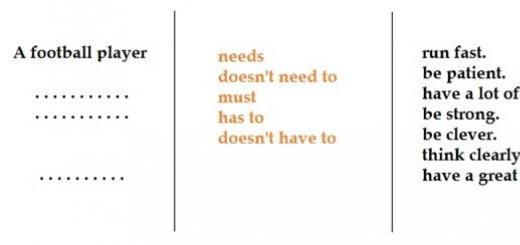Programmer is a specialist who develops algorithms and computer programs based on special mathematical models. The profession is promising and in great demand all over the world (median value). You can become a programmer at any age. The profession is suitable for men and women with interests in programming, mathematics, languages, as well as good analytical skills and developed logic (can you pass the test to see if you can become a programmer). There are also colleges that teach programming, but you can learn it on your own; as a rule, programmers with skills are valued higher. Exist . The profession has its own. The profession is suitable for those who are interested in computer science (see choosing a profession based on interest in school subjects).
Varieties
In programming, not only practical skills are given first place, but also the ideas of a specialist. Programmers can be divided into three categories depending on their specialization:
- Application programmers They are mainly engaged in the development of applied software - games, accounting programs, editors, instant messengers, etc. Their area of work also includes the creation of software for video and audio surveillance systems, access control systems, fire extinguishing or fire alarm systems, etc. Their responsibilities also include adapting existing programs to the needs of a particular organization or user.
- System programmers develop operating systems, work with networks, and write interfaces to various distributed databases. Specialists in this category are among the rarest and highest paid. Their task is to develop software systems (services) that, in turn, control the computing system (which includes the processor, communications and peripheral devices). The list of tasks also includes ensuring the functioning and operation of the created systems (device drivers, boot loaders, etc.).
- Web programmers also work with networks, but, in most cases, with global ones - the Internet. They write the software components of websites, create dynamic web pages, web interfaces for working with databases.
Features of the profession
Based on the analysis of mathematical models and algorithms for solving scientific, technical and production problems, the programmer develops programs for performing computational work. Draws up a computational scheme for a method for solving problems, translates solution algorithms into formalized machine language. Determines the information entered into the machine, its volume, methods for monitoring operations performed by the machine, the form and content of source documents and calculation results. Develops layouts and schemes for input, processing, storage and output of information, conducts desk checks of programs.
Defines a set of data that provides a solution to the maximum number of conditions included in a given program. Conducts debugging of developed programs, determines the possibility of using ready-made programs developed by other organizations. Develops and implements programming automation methods, standard and standard programs, programming programs, translators, input algorithmic languages.
Performs work on the unification and typification of computing processes, participates in the creation of catalogs and cards of standard programs, in the development of forms of documents subject to machine processing, in design work to expand the scope of application of computer technology.
Pros and cons of the profession
Pros:
- high profit payment;
- relatively high demand for specialists;
- sometimes you can get a job without having a higher education;
- is primarily a creative profession.
Minuses:
- you often have to explain the same thing a lot, since what is clear and obvious to the programmer is not always clear and obvious to the user;
- work in emergency mode (sometimes) in a stressful situation;
- the profession leaves a specific imprint on the character, which not everyone around him likes.
Place of work
- IT companies and web studios;
- research centers;
- organizations that include in their structure a staff unit or departments of programmers.
Important qualities
Programming is a rapidly evolving field, so a programmer must be able to quickly adapt to the current state of technology and constantly learn new technologies. Therefore, the ability to self-learn is one of the main skills that a programmer must have. Otherwise, in a few years his value as a specialist will be noticeably lower.
Proficiency in English at the level of reading technical documentation is another mandatory requirement for representatives of this profession. For such specialists, the ability to work in a team, on large projects, with collective development tools, and with large financial systems (budgetary, banking, management accounting) is very important. For applicants for the position of lead programmer, project and team management skills, independence, initiative, as well as the ability to bear personal responsibility for the assigned task are desirable.
Programmer training
STEP Computer Academy - IT education as it should be. Since 1999, they are designers and systems engineers who cannot be replaced by artificial intelligence. To do this, in addition to deep specialized knowledge, they are taught to understand tasks, think in ready-made projects and work in a team. And they do everything to ensure that STEP Academy graduates are hired immediately after defending their diplomas.
In this course, you can obtain a programmer profession remotely in 1-3 months. Diploma of professional retraining established by the state. Training in a completely distance learning format. The largest educational institution of additional professional education. education in Russia.
Profession web developer from 0 to PRO. In 115 hours you can learn how to create websites and online stores, and earn 120 thousand rubles a month from this. After completing the training, guaranteed employment. Advantages: access to the course forever, 3 specializations at the end, flexible and open schedule of classes, work with a personal mentor, employment is guaranteed with documents.
Universities
Salary
Programmer is one of the most popular and highly paid professions in Russia. Even the least advanced specialist can find a job in accordance with his level of knowledge, and then gradually learn and gain experience. The intern's salary is about $1000. A full-time programmer in a mid-level company (not IT) earns up to $1500-1800, a little more in an organization associated with mass software development. The lead programmer's salary is $2500-3000. The next step is the head of the IT department. The required knowledge is supplemented by mandatory work experience, foreign language proficiency, personnel management skills, etc., and earnings can reach $4,000. A good programmer can become the manager of a large software development project, and here the income level reaches $5,000 or more.
Salary as of 12/10/2019
Russia 40000—150000 ₽
Moscow 50000—120000 ₽
Career steps and prospects
A good start to your career can be joining a group of programmers when developing a project. Large projects often attract the attention of Western companies, which “outbid” Russian programmers. For example, once a group of our young scientists developed the Elbrus processor for the Ministry of Defense, but in the end they were all bought up by Intel Corporation, and now our scientists and programmers work abroad, and the Elbrus project itself has slowly closed down. The problem of “brain drain” in this profession is one of the most acute.
A programmer can make a career up to the head of a group of programmers (team leader), IT director of an enterprise, IT project manager, etc. During the course of work, a programmer can move within his specialty, improving professionally.
Famous and great programmers
- Knut Donald Erwin
- Matsumoto Yukihiro
- Tanenbaum Andrew
- Raymond Eric Stephen
- Fowler Martin
- Hopper Grace
- Stallman Richard Matthew
- Kay Alan
- Meyer Sid
- Stroustrup Björn
The emergence of programming as an occupation and, especially, as a professional activity is difficult to date unambiguously.
Often considered the first programmable device, the jacquard loom was built in 1804 by Joseph Marie Jacquard, which revolutionized the weaving industry by providing the ability to program patterns on fabrics using punched cards.
The first programmable computing device, the Analytical Engine, was designed by Charles Babbage (but was unable to build it). On July 19, 1843, Countess Ada Augusta Lovelace, daughter of the great English poet George Byron, is believed to have written the first program in human history for the Analytical Engine. This program solved the Bernoulli equation, which expresses the law of conservation of energy of a moving fluid.
In her first and only scientific work, Ada Lovelace examined a large number of issues. A number of general principles expressed by her (the principle of saving working memory cells, the connection of recurrent formulas with cyclic computation processes) have retained their fundamental importance for modern programming. Babbage's materials and Lovelace's comments outlined concepts such as subroutine and subroutine library, instruction modification, and index register, which began to be used only in the 1950s.
However, none of the programs written by Ada Lovelace were ever launched.
Ada Augusta, Countess of Lovelace, is generally considered an honorary first programmer (although, of course, writing a single program cannot be considered an occupation or professional activity by modern standards). History has preserved her name in the name of the universal programming language “Ada”.
The first working programmable computer (1941), the first programs for it, and also (with certain reservations) the first high-level programming language Plankalküll were created by the German engineer Konrad Zuse.
History has not preserved the names of the people who first began to professionally carry out the work of programming itself (in isolation from setting up computer hardware), since at first programming was viewed as a secondary setup operation.
Murphy's Laws for Programmers
1. Nothing works as planned.
2. Nothing is programmed the way it should work.
3. A good programmer is characterized by the ability to prove why a task cannot be completed when he is simply too lazy to complete it.
4. It takes three times less time to solve a problem than to discuss all the pros and cons of its solution.
5. The promised delivery date is the carefully calculated project completion date plus six months.
6. The programmer always knows the sequence of actions by which a user can hang his program, but he never fixes this problem, hoping that no one will ever think of executing this sequence.
7. Real programmers love Windows - all mistakes made due to their own stupidity can be blamed on Microsoft.
8. Consequence - 99% of the problems blamed on Microsoft are a consequence of the stupidity of the programmers themselves.
9. In a fit of anger, for some reason everyone is hitting the innocent monitor instead of the system unit.
10. In the event of a hunger strike, a real programmer will be able to eat food picked out from under the keyboard buttons for another month.
11. A real programmer has already replaced at least three beer-drenched keyboards.
12. Anyone who has problems setting up the encoding is automatically considered Neanderthals.
13. Amateurish conversations about computers cause severe nausea, even vomiting. The question of how to change the “wallpaper” in Windows makes you want to cut the throat of the questioner.
14. For most people who need your help, the reason for the error in the program is purely genetic.
15. HTML, HTTP, FTP, SMTP, TCP/IP, RTFM, etc. These are words, not abbreviations.
16. The phrase “mouse-norushka” does not make any sense.
17. The most mystical problems, widely inflated and advertised, in the end turn out to be your stupidest mistakes.
18. Corollary - if your program performs mystical actions, then you did something incredibly stupid.
19. The worst feeling for a programmer is when ten people are standing around you and everyone is trying to find the cause of the problem in your program, and you already understand what the problem is, but you are afraid to say it, because it is something blatantly stupid...
20. The solution to all life's problems is on the Internet. You just need to be able to search well.
21. A conflict of logical instructions in life causes a fatal error in the work of the programmer’s brain - a rise in temperature and severe dizziness, including vomiting or loss of consciousness, are possible.
22. Programmers despise those who despise programmers more than those who despise programmers despise programmers who despise those who despise them.
23. If you understood the previous one, then you are a programmer.
There are 10 types of people in this world - those who understand the binary number system and those who do not understand it.
Video: you're a programmer
Read: 8 min.
Is it true that programming is the most in-demand specialty in the world? Who are system and application programmers? How many years does it take to study to become a programmer? Which university or college should I go to to become a programmer?
They say that there are 10 types of people in the world. Those who understand binary code... and those who don't.
Programmers' humor
Programming originated in the 19th century, and until the mid-20th century, when information technology exploded, creating programs for a machine was akin to an art. Programming was the preserve of a select few. Today, the profession of a programmer is widespread and in great demand. In 2017, there were 18.2 million software developers in the world, of which 1.3 million were in Russia.
Let's see what the future of the programming profession is. And what threatens him.
Description of the profession
Where to work
Development companies (Booking.com, Mail.ru, Yandex, Unisender services)
IT departments and digital marketing departments of organizations (Sberbank of Russia, Gazprom, Tinkoff Bank)
System integrators (Croc, Softline, Technoserv, Lanit, I-Teco)
Career opportunities
Due to the rapid growth of the IT sector and the shortage of software developers, you can start working as a programmer while still in college. From the 2nd or 3rd year you can get a job as a junior developer and start moving up the career ladder. And at the same time receive a salary worthy for a student of 30-50 thousand rubles.
The programmers themselves estimate the duration of each stage as follows:
For the first six months to a year and a half of real experience, you are junior
With active learning, you will be middle for the next 1-3 years of work
A programmer with 4-6 years of experience is a senior
But, of course, it is worth remembering that the boundaries are relative, and a more active and inquisitive developer will be able to master all the skills of a senior developer in 3 years.
In addition to deep specialization in programming, a programmer can move into related areas within an IT company - design, marketing, analytics, management. A programmer can become a software architect, devops engineer, or IT project manager if he is interested in it and has the necessary competencies. For example, to work as a manager, he will need communication skills, initiative, the ability to form a team and control business processes.
Salary (salary range)
The salary of a programmer directly depends on specialization and qualifications. The least paid positions are junior developers who are just learning. And the most paid in the labor market are software architects and systems engineers, who are responsible for the product or project as a whole. Therefore, the salary range for programmers can be very wide:
- ✔
30,000 – 260,000 rubles
Now the IT industry in general and programming in particular are at the peak of demand. Companies compete for qualified specialists. In the next 5 years, programmers will have a prosperous life and high salaries, because there will be slightly fewer young workers. A period of demographic depression will come due to the low birth rate in the early 90s.
But the IT market faces several dangers. Firstly, learning to program now begins almost in kindergarten. The most famous learning languages are Scratch from MIT and Blockly from Google. Probably, programming skills will be as widespread as knowledge of the English language, that is, they will be included in the “gentleman's kit” when applying for a job. And if almost everyone owns it, then the value of the work decreases.
Secondly, IT education is now provided by almost every college and university. After a shortage, the market may become saturated with professional programmers, and their salaries will fall.
Third, there are countries, in particular India, where IT education is developing even faster. And at some point, programming services will saturate the global market, as has now happened with goods produced in China. It will be difficult to compete with Indian programmers on price.
If you want to receive the latest articles about professions, subscribe to our newsletter.
Programmer is a specialist who develops algorithms and computer programs based on special mathematical models. The profession is promising and in great demand all over the world (median value). You can become a programmer at any age. The profession is suitable for men and women with interests in programming, mathematics, languages, as well as good analytical skills and developed logic (can you pass the test to see if you can become a programmer). There are also colleges that teach programming, but you can learn it on your own; as a rule, programmers with skills are valued higher. Exist . The profession has its own. The profession is suitable for those who are interested in computer science (see choosing a profession based on interest in school subjects).
Varieties
In programming, not only practical skills are given first place, but also the ideas of a specialist. Programmers can be divided into three categories depending on their specialization:
- Application programmers They are mainly engaged in the development of applied software - games, accounting programs, editors, instant messengers, etc. Their area of work also includes the creation of software for video and audio surveillance systems, access control systems, fire extinguishing or fire alarm systems, etc. Their responsibilities also include adapting existing programs to the needs of a particular organization or user.
- System programmers develop operating systems, work with networks, and write interfaces to various distributed databases. Specialists in this category are among the rarest and highest paid. Their task is to develop software systems (services) that, in turn, control the computing system (which includes the processor, communications and peripheral devices). The list of tasks also includes ensuring the functioning and operation of the created systems (device drivers, boot loaders, etc.).
- Web programmers also work with networks, but, in most cases, with global ones - the Internet. They write the software components of websites, create dynamic web pages, web interfaces for working with databases.
Features of the profession
Based on the analysis of mathematical models and algorithms for solving scientific, technical and production problems, the programmer develops programs for performing computational work. Draws up a computational scheme for a method for solving problems, translates solution algorithms into formalized machine language. Determines the information entered into the machine, its volume, methods for monitoring operations performed by the machine, the form and content of source documents and calculation results. Develops layouts and schemes for input, processing, storage and output of information, conducts desk checks of programs.
Defines a set of data that provides a solution to the maximum number of conditions included in a given program. Conducts debugging of developed programs, determines the possibility of using ready-made programs developed by other organizations. Develops and implements programming automation methods, standard and standard programs, programming programs, translators, input algorithmic languages.
Performs work on the unification and typification of computing processes, participates in the creation of catalogs and cards of standard programs, in the development of forms of documents subject to machine processing, in design work to expand the scope of application of computer technology.
Pros and cons of the profession
Pros:
- high profit payment;
- relatively high demand for specialists;
- sometimes you can get a job without having a higher education;
- is primarily a creative profession.
Minuses:
- you often have to explain the same thing a lot, since what is clear and obvious to the programmer is not always clear and obvious to the user;
- work in emergency mode (sometimes) in a stressful situation;
- the profession leaves a specific imprint on the character, which not everyone around him likes.
Place of work
- IT companies and web studios;
- research centers;
- organizations that include in their structure a staff unit or departments of programmers.
Important qualities
Programming is a rapidly evolving field, so a programmer must be able to quickly adapt to the current state of technology and constantly learn new technologies. Therefore, the ability to self-learn is one of the main skills that a programmer must have. Otherwise, in a few years his value as a specialist will be noticeably lower.
Proficiency in English at the level of reading technical documentation is another mandatory requirement for representatives of this profession. For such specialists, the ability to work in a team, on large projects, with collective development tools, and with large financial systems (budgetary, banking, management accounting) is very important. For applicants for the position of lead programmer, project and team management skills, independence, initiative, as well as the ability to bear personal responsibility for the assigned task are desirable.
Programmer training
STEP Computer Academy - IT education as it should be. Since 1999, they are designers and systems engineers who cannot be replaced by artificial intelligence. To do this, in addition to deep specialized knowledge, they are taught to understand tasks, think in ready-made projects and work in a team. And they do everything to ensure that STEP Academy graduates are hired immediately after defending their diplomas.
In this course, you can obtain a programmer profession remotely in 1-3 months. Diploma of professional retraining established by the state. Training in a completely distance learning format. The largest educational institution of additional professional education. education in Russia.
In 115 hours you can learn how to create websites and online stores, and earn 120 thousand rubles a month from this. After completing the training, guaranteed employment. Advantages: access to the course forever, 3 specializations at the end, flexible and open schedule of classes, work with a personal mentor, employment is guaranteed with documents.
Universities
Salary
Programmer is one of the most popular and highly paid professions in Russia. Even the least advanced specialist can find a job in accordance with his level of knowledge, and then gradually learn and gain experience. The intern's salary is about $1000. A full-time programmer in a mid-level company (not IT) earns up to $1500-1800, a little more in an organization associated with mass software development. The lead programmer's salary is $2500-3000. The next step is the head of the IT department. The required knowledge is supplemented by mandatory work experience, foreign language proficiency, personnel management skills, etc., and earnings can reach $4,000. A good programmer can become the manager of a large software development project, and here the income level reaches $5,000 or more.
Salary as of 12/10/2019
Russia 40000—150000 ₽
Moscow 50000—120000 ₽
Career steps and prospects
A good start to your career can be joining a group of programmers when developing a project. Large projects often attract the attention of Western companies, which “outbid” Russian programmers. For example, once a group of our young scientists developed the Elbrus processor for the Ministry of Defense, but in the end they were all bought up by Intel Corporation, and now our scientists and programmers work abroad, and the Elbrus project itself has slowly closed down. The problem of “brain drain” in this profession is one of the most acute.
A programmer can make a career up to the head of a group of programmers (team leader), IT director of an enterprise, IT project manager, etc. During the course of work, a programmer can move within his specialty, improving professionally.
Famous and great programmers
- Knut Donald Erwin
- Matsumoto Yukihiro
- Tanenbaum Andrew
- Raymond Eric Stephen
- Fowler Martin
- Hopper Grace
- Stallman Richard Matthew
- Kay Alan
- Meyer Sid
- Stroustrup Björn
The emergence of programming as an occupation and, especially, as a professional activity is difficult to date unambiguously.
Often considered the first programmable device, the jacquard loom was built in 1804 by Joseph Marie Jacquard, which revolutionized the weaving industry by providing the ability to program patterns on fabrics using punched cards.
The first programmable computing device, the Analytical Engine, was designed by Charles Babbage (but was unable to build it). On July 19, 1843, Countess Ada Augusta Lovelace, daughter of the great English poet George Byron, is believed to have written the first program in human history for the Analytical Engine. This program solved the Bernoulli equation, which expresses the law of conservation of energy of a moving fluid.
In her first and only scientific work, Ada Lovelace examined a large number of issues. A number of general principles expressed by her (the principle of saving working memory cells, the connection of recurrent formulas with cyclic computation processes) have retained their fundamental importance for modern programming. Babbage's materials and Lovelace's comments outlined concepts such as subroutine and subroutine library, instruction modification, and index register, which began to be used only in the 1950s.
However, none of the programs written by Ada Lovelace were ever launched.
Ada Augusta, Countess of Lovelace, is generally considered an honorary first programmer (although, of course, writing a single program cannot be considered an occupation or professional activity by modern standards). History has preserved her name in the name of the universal programming language “Ada”.
The first working programmable computer (1941), the first programs for it, and also (with certain reservations) the first high-level programming language Plankalküll were created by the German engineer Konrad Zuse.
History has not preserved the names of the people who first began to professionally carry out the work of programming itself (in isolation from setting up computer hardware), since at first programming was viewed as a secondary setup operation.
Murphy's Laws for Programmers
1. Nothing works as planned.
2. Nothing is programmed the way it should work.
3. A good programmer is characterized by the ability to prove why a task cannot be completed when he is simply too lazy to complete it.
4. It takes three times less time to solve a problem than to discuss all the pros and cons of its solution.
5. The promised delivery date is the carefully calculated project completion date plus six months.
6. The programmer always knows the sequence of actions by which a user can hang his program, but he never fixes this problem, hoping that no one will ever think of executing this sequence.
7. Real programmers love Windows - all mistakes made due to their own stupidity can be blamed on Microsoft.
8. Consequence - 99% of the problems blamed on Microsoft are a consequence of the stupidity of the programmers themselves.
9. In a fit of anger, for some reason everyone is hitting the innocent monitor instead of the system unit.
10. In the event of a hunger strike, a real programmer will be able to eat food picked out from under the keyboard buttons for another month.
11. A real programmer has already replaced at least three beer-drenched keyboards.
12. Anyone who has problems setting up the encoding is automatically considered Neanderthals.
13. Amateurish conversations about computers cause severe nausea, even vomiting. The question of how to change the “wallpaper” in Windows makes you want to cut the throat of the questioner.
14. For most people who need your help, the reason for the error in the program is purely genetic.
15. HTML, HTTP, FTP, SMTP, TCP/IP, RTFM, etc. These are words, not abbreviations.
16. The phrase “mouse-norushka” does not make any sense.
17. The most mystical problems, widely inflated and advertised, in the end turn out to be your stupidest mistakes.
18. Corollary - if your program performs mystical actions, then you did something incredibly stupid.
19. The worst feeling for a programmer is when ten people are standing around you and everyone is trying to find the cause of the problem in your program, and you already understand what the problem is, but you are afraid to say it, because it is something blatantly stupid...
20. The solution to all life's problems is on the Internet. You just need to be able to search well.
21. A conflict of logical instructions in life causes a fatal error in the work of the programmer’s brain - a rise in temperature and severe dizziness, including vomiting or loss of consciousness, are possible.
22. Programmers despise those who despise programmers more than those who despise programmers despise programmers who despise those who despise them.
23. If you understood the previous one, then you are a programmer.
There are 10 types of people in this world - those who understand the binary number system and those who do not understand it.
Video: you're a programmer
Many schoolchildren, having graduated from their alma mater, are faced with choosing a profession, while others, already having an education, simply do not want to work in their specialty. Now, in modern times, when technology is developed and various gadgets are so widely used, the profession of a programmer is in great demand. Therefore, before you go to study to become the “king of computers” or take additional courses, you need to figure out what the business is, what pros and cons it has.
A programmer or IT technician is a person who develops scripts for different types of computers, ranging from simple personal ones to industrial ones. To summarize, a programmer is engaged in programming various devices, working in a team or individually.
Not a single company can do without a technician or programmer, which is why these professions are so in demand, however, like all other areas of effort, it has its drawbacks. A programming specialist must not only know the description of the latest new programs in order to translate the manager’s assumptions into reality, but must also be a creative person.
Features of training
It is worth knowing that it is important for a future specialist to have a good knowledge of mathematics, as well as an understanding of computer science, physics and a good knowledge of the Russian language. Also, some companies require knowledge of English. If at school there were no problems with learning foreign languages, then the profession of a programmer is already halfway yours. When you have a problem with English, but still want to become a programmer, you will have to visit a tutor.
The main advantage of an IT technician is that this profession can be acquired not only in specialized centers, but also mastered independently at home. To do this, to help those who are thirsty for digital knowledge, there will be tutorials where the programs are clearly described, and educational sites on the Internet or books are also suitable. But still, as practice shows, information is best learned through examples. It’s good if there is a person (friend or colleague) who can clearly tell and teach everything.
The work of an IT technician can have several directions:
- Application Technician. The specialist is engaged in software, its development and improvement for the convenience of work in organizations. Usually these are specialists of the 1C program; technicians deal with settings, descriptions of functions and modifications to the requirements of a particular company.
- System direction. Employees are engaged in the development and description of databases and interfaces. They are also social media administrators.
- TP (technical support) specialist. Indispensable workers who help eliminate problems and errors in a short time.
- Tester. In particular, they are engaged in finalizing and testing ready-made programs.
Regardless of which direction is chosen, any programmer develops standard or highly specialized program codes and tools.
What should a programmer be like?
Of course, to become a specialist, you need to have certain qualities, this also applies to programmers. To gain knowledge, and subsequently a job, a future specialist must have the following talents:
- have a non-standard mindset, preferably technical,
- understand information systems and logarithms,
- be fast and mobile,
- have a good memory
- be able to express thoughts clearly,
- be diligent, collected and attentive,
- be able to solve complex problems with a technical focus.
Also, the programmer must have excellent vision, but in such cases, with good knowledge, you can resort to wearing glasses or lenses.
Pros and cons of the profession
Like any profession, specialization in programming has its advantages and disadvantages. The main advantage of the profession is its demand, as well as high income. IT technicians are a very popular position; the variety of jobs allows the future employee to choose his direction, as well as his place of work (at home or abroad).
But still, there are the following disadvantages of being a programmer:
- High competition. The best places are taken by those who know their profession perfectly.
- It takes perseverance and diligence. Not every person can sit for several hours in a row developing a program or solving an algorithm.
- You need to study a lot and constantly update your knowledge base, because the world of technology does not stand still, and to be the first in your business, you need to constantly develop.

Most employers require proof of knowledge, so in any case, training is necessary; you can at least take short courses.
Despite the existing disadvantages, the advantages largely outweigh. You can try contacting different organizations, posting your resume, there will be an employer for every programmer.
Where to find a job?
An IT technician in general is a multifaceted profession. Despite the fact that, according to statistics, there are 15 workers per 1 workplace, it is still possible to get your place in the sun. It all depends on the skills and determination of each person, because if you sit and do nothing, you are unlikely to get a high position.
Every future specialist must first decide for himself what he wants. After all, you can not only work and go to the office 5 times a week, but also become a free programmer or freelancer.
If the choice falls on a company, then the first thing you need to do is write a resume. It should indicate:
- existing skills, even if there is no supporting document,
- education,
- experience,
- extra skills,
- personal qualities.
Many employers, when they see a promising employee, may not even look to see whether he has an educational document or not. Not only knowledge is important here, a programmer must have many versatile qualities, which is why self-development is so important.
If “free swimming” was chosen, then you also need to try. The main advantage of freelancers is that in most cases employers do not require documents, as well as freedom in choosing work. You can independently search for projects, technical specifications and carry them out in any convenient place. But there is still a minus - such work is unstable and does not provide guarantees. Which path to choose is up to everyone to decide.
Programmers' salaries
As already mentioned, a programmer is a very profitable profession. However, many are still interested in the question, how much do programmers earn? Salary depends on the level of the specialist, as well as where he works. In big cities, specialists work in good companies, and there is a place for everyone. As for smaller cities, salaries here are lower, but correspond to the standard of living.
When choosing a place to work, you need to pay attention to what level of importance programming occupies in the company; this affects what salary the programmer will have in the future.
To become the head of an IT department, you need to have a strong character, be able to make your own informed decisions, defend them, and also be patient and purposeful. All these qualities will help you further advance your career and become a first-class programmer.
Today, hardly anyone will ask the programmer who he is? We all access the World Wide Web every day, and most of us work with computer programs. The job of a programmer is to develop and implement algorithms and programs. Good programmers are worth their weight in gold, which is why their salaries are quite high.
What types of programmers are there?
The types of computer programs vary greatly, which is why there are specializations. They differ depending on what language and what technologies the programmer uses when creating programs.
Mainly:
- systemic. Are engaged in the creation of operating systems and database shells;
- applied. They are the ones who make software so that they can carry out their activities;
- web programmers. They take an active part in the creation of websites and stores, and also create programs that manage entire website systems.
There are probably no enterprises and organizations that do not require programmers to work. They work in accounting, legal, manufacturing and specialized forms of IT at a professional level.
What a programmer should know and be able to do
To get a job in a good company with a large salary, you need to have an excellent understanding of the technologies and languages required for work, have at least some experience in creating programs, understand what auxiliary programs are and be able to use them, and be able to read other people’s codes. An advanced specialist, rather than an amateur amateur, will also have an excellent command of the English language to read technical documentation.
Typically, management also looks at such qualities of programmer employees as:
- self-learning ability . This field of activity is developing rapidly, new technologies are being introduced, a lot is changing, so it is vitally important to constantly learn in order to maintain your qualifications;
- skill to work in team . Many launched projects involve the participation of many people, and therefore programmers who can work in a team on common tasks are valued;
- initiative and responsibility . Difficulties may arise in the process of work; the programmer should not be sluggish and indifferent to them. Non-standard solutions and the ability to finish what you start are always welcome.
There are several advantages to this profession. Firstly, a programmer can count on permanent employment and good fees, and secondly, sometimes companies hire people who do not have a higher education, that is, self-taught people who have figured out all the nuances on their own. And thirdly, a programmer is the same creative profession as an artist or musician: unprecedented horizons for self-realization in this matter open up.
There are also disadvantages:
- in some cases, the programmer is required to work non-stop, when, for example, for some reason an unauthorized failure occurs in the system or program, a specialist must urgently fix the problem;
- forced to spend most of their time at the computer, programmers willy-nilly become misanthropes, which does not contribute to the successful search for marriage partners and making new friends;
- routine work due to the fact that not all users are advanced: a programmer can get tired of repeatedly explaining things that are crystal clear to him, which sometimes leads to nervous breakdowns.
The best person to explain this to you is the programmer himself. Find a person with this profession among your friends and find out details that were not found in this article.
(function(w, d, n, s, t) ( w[n] = w[n] || ; w[n].push(function() ( Ya.Context.AdvManager.render(( blockId: "R-A -329917-3", renderTo: "yandex_rtb_R-A-329917-3", async: true )); )); t = d.getElementsByTagName("script"); s = d.createElement("script"); s .type = "text/javascript"; s.src = "//an.yandex.ru/system/context.js"; s.async = true; , this.document, "yandexContextAsyncCallbacks");










